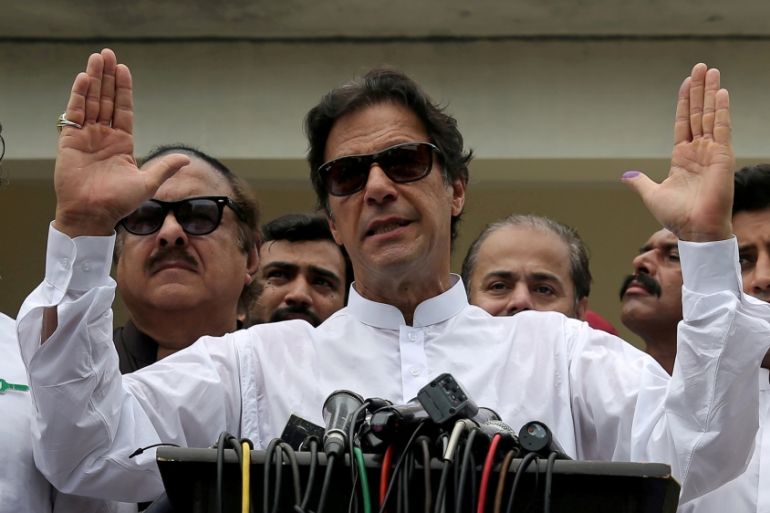Pakistan PM’s remarks on Afghan peace process stir diplomatic row
Afghans criticise Imran Khan for suggesting setting up of an interim government to help with peace talks with Taliban.

Kabul, Afghanistan – People in Afghanistan have criticised Pakistani Prime Minister Imran Khan’s reported remarks suggesting the formation of an interim government in the war-torn South Asian country.
The West-backed government led by President Ashraf Ghani recalled its ambassador from Pakistan on Wednesday in protest against Khan’s “irresponsible” statement, setting off a diplomatic row.
Keep reading
list of 4 itemsHas the Taliban kept its promises in Afghanistan?
Ghani unlikely to have fled Kabul with millions in cash: Report
Afghan ex-President Ghani defends decision to flee the country
“Any Afghan who loves his country, will feel bad with such statements coming from the prime minister of Pakistan,” said Ahmad Jawid Safi, 30, who has spent many years in Pakistan as a refugee escaping war in Afghanistan.
In a report published in Pakistan’s local news website the Express Tribune on Tuesday, the Pakistani prime minister suggested an interim government will help break the deadlock in the ongoing peace talks spearheaded by the United States.
The Pakistani leader also blamed the Afghan government for the failure of peace talks calling it “a hurdle in peace process”.
US and Taliban negotiators wrapped up their longest round of talks in Doha earlier this month hailing progress on some key issues – but without producing a major breakthrough.
In separate statements, both Taliban and US officials said the negotiations in Qatar produced developments on the withdrawal of US troops and security issues related to any pullout by Washington.
US President Donald Trump wants to pull out nearly 14,000 troops stationed in the country since 2001, when it intervened to topple the Taliban from power in the wake of the 9/11 attacks.
But since then the Taliban group has waged an armed rebellion against what they call foreign occupying forces, inflicting heavy human toll.
US special peace envoy to Afghanistan Zalmay Khalilzad, who led several rounds of talks with the Taliban in Doha, dubbed Khan’s comments “inappropriate”.
Afghanistan accuses Pakistan of supporting the Taliban – a charge Islamabad denies.
Afghan Ministry of Foreign Affairs said it “deemed such statements an obvious example of Pakistan’s interventional policy and disrespect to the national sovereignty and determination of the people of Afghanistan”.
Safi, who returned to his ancestral home of Mazar-e-Sharif in northern Afghanistan after the fall of the Taliban regime in 2001, said Islamabad “has never been honest with Afghans or their allies”.
“This isn’t the first time they have interfered in our politics. Pakistan wants to weaken Afghanistan politically, economically and socially,” said Safi, who works at an international development agency.
Echoing similar concerns, Idrees Stanikzai, an Afghan politician and leader of Youth Trend Afghanistan, a social movement, alleged that the idea of an interim government had been pushed by Pakistan’s establishment several times.
“The Pakistanis are threatened by the work President Ashraf Ghani has been doing specifically on economic projects that have made us significantly less dependent on Pakistan,” Stanikzai said.
“They want a government that pleases Taliban and Taliban in the Afghan government will oblige to them.”
Former National Security Adviser and presidential hopeful Hanif Atmar, who has previously supported a call for the interim government, also came out in condemnation of Khan’s comment calling it “wilful interference in Afghanistan’s internal affairs”.
|
|
“Afghanistan is an independent country and it’s up to Afghans to decide how we run our government,” Qadir Shah, spokesperson to Atmar, told Al Jazeera.
Shah, however, defended Atmar’s call for a unity government to achieve “permanent peace”.
“For the sake of Afghan unity, permanent peace, and to help maintain democratic process, we strongly suggest that at the end of their term the current government hand over to another administration or interim government, in the presence of national gathering (Loya Jirga),” Shah said.
‘Little pygmy’
It wasn’t just Afghans who jumped into the debate. US Ambassador to Afghanistan John R Bass, took potshots at the Pakistani prime minister on Twitter, asking the former cricketer to “resist temptation to ball-tamper with the Afghanistan peace process”.
Some aspects of #cricket apply well in diplomacy, some do not. @ImranKhanPTI, important to resist temptation to ball-tamper with the #Afghanistan peace process and its internal affairs. #AfgPeace
— Chargé d’Affaires Ross Wilson (@USAmbKabul) March 27, 2019
But his comments drew a stinging response from Pakistan human rights minister Shireen Mazari, who called Bass a “little pygmy” on Twitter.
The US ties with Pakistan have been tense and on more than one occasion President Trump has rebuked Pakistan for lack of support in anti-terrorism efforts.
Clearly you little pygmy your knowledge of ball tampering is as void as your understanding of Afghanistan and the region! Clearly in your case ignorance is certainly not bliss! Another sign of Trumpian mischief a la Khalilzad style! https://t.co/ZOySvWJNDq
— Shireen Mazari (@ShireenMazari1) March 27, 2019
He also suspended up to $1.3bn in military aid to Pakistan further souring relations. However, the US also continues to seek support from Pakistan in the ongoing peace talks with the Taliban, led by Khalilzad.
Former Indian ambassador to Afghanistan Amar Sinha expressed concerns at the possibility of an interim government.
“It is for Afghans to decide how they wish to reintegrate Taliban back in society and to normalcy. Others should only encourage all sides to achieve a ceasefire and peace at the earliest,” Sinha told Al Jazeera.
India is a close ally of the Afghan government.
Many Afghans fear the return of the Taliban, which imposed strict interpretations of Islamic law that included a ban on women’s education during their tenure in power (1996-2001).
“Afghanistan has grown to a better country after 9/11. We can’t afford to start everything from scratch again,” Safi, who has faced adversity and displacement due to the war, said.
“We don’t want to turn backward to the state of affairs from two decades ago.”
|
|